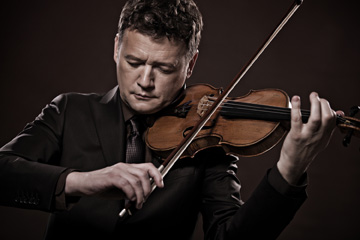When excellent Czech violinist Ivan Ženatý strides onstage with his pianist James Vaughan, one is in for an evening of artistry, probably whatever the program; presented by Mid-America Productions in an all-Czech program in Weill Hall, the duo brought their audience twofold pleasure. Underappreciated works by Antonin Dvořák, Leoš Janáček, and Bedřich Smetana are rarely combined as an entire recital here in the U.S., but if they were, it is unlikely that they would be performed as well. Mr. Ženatý, veteran performer claiming a large array of prizes, recordings, and collaborations, was recently appointed to the faculty of the Cleveland Institute of Music, having taught also at the Hochschule für Musik Carl Maria von Weber in Dresden. He is a performer who clearly endows each note with a world of experience, though with apparent ease, and it is heartening to know that a performer of such musical integrity will be transmitting some of his artistry to the next generation.
Polished and elegant from music to stage presence, the duo filled their first half of the program with all Dvořák (1841-1904). The composer’s Romantic Pieces for violin and piano, Op. 75, B. 150 (1886-87), first composed for two violins and viola (with movements originally entitled Cavatina, Capriccio, Romance, and Elegy), were heard in the composer’s own violin-piano arrangement. Mr. Ženatý projected his phrases with a mellow, cantabile violin sound on a 1740 Giuseppe Guarneri del Jesu violin (courtesy of the Harmony Foundation of New York). A feeling of gemütlichkeit permeated the intimate Weill Hall – somewhat in keeping with Dvorak’s own home readings of these pieces. At first the balance seemed an issue, and the piano (with the lid on the full stick) seemed a bit overwhelming, but in a very brief time the duo melded perfectly, and this listener was glad for the clarity in each detail of what was a true collaboration. Mr. Vaughan particularly impressed with his flexibility in adjusting his feather-light repeated notes – in this piano’s rich middle register, no less – to each nuance of the violin. He was outstanding in the most difficult dovetailing. Ženatý ramped up the energy for the quixotic second movement, and the third, wonderfully Schubertian with its gentle lyricism, was a dream. The duo conveyed the mournful spirit of the fourth movement with haunting beauty, and one could feel the audience sighing collectively afterwards.
Dvořák’s Sonata in F Major for violin and piano, Op. 57, moved the recital into more involved and weighty writing. It brought more challenges of all kinds, and they were handled well, with only occasional glitches in intonation. Mr. Ženatý and Mr. Vaughan brought out the Brahmsian breadth and nobility of this work, challenging the program notes’ assertion that, unlike Beethoven, Brahms, and others, this Sonata “has neither architectural grandeur nor higher unity in its contrasting ideas.” On a side note, one wonders whether such a comment is the best way to maximize the listeners’ experience as good program notes can do! The performers, on the other hand, advocated for the piece with each lovingly shaped phrase, and this listener would enjoy hearing them do it again.
After intermission came the Sonata for violin and piano JW VII/7 by Leoš Janáček (1854-1928), a work using folk elements in a dark, at times violent way. Just as the programming reflected a broad range of Czech musical style, this duo’s expressive range was explored to the fullest. While neither performer resorted to demonstrative excess, there was plenty of drama in the sound itself. The first movement captured the wrestling intensity of the jagged, even spasmodic motives. It was an impassioned performance, as this piece demands, reflecting the troubled times of Europe in 1914. The second movement, Ballada, found the duo by contrast on a journey at times nostalgic and at times desperately longing. Long, melodic lines were soulfully shaped, to heartbreaking effect in Ženatý’s hands. In the third movement, the sounds of war were evoked in brutal and strident accented blows, which Ženatý and Vaughan played to the hilt; as Janacek himself wrote, “I could just about hear sound of the steel clashing in my troubled head.” The final quiet utterances of the fourth movement left the audience again suspended in silence.
A comforting close came with Bedřich Smetana’s “Z domoviny” (“From My Homeland”) benefiting from more of Ženatý’s golden-toned phrases and Vaughan’s expert support. It built to a brilliant and spirited close capping off a richly satisfying evening. Prolonged applause was rewarded with Dvořák ‘s Mazurek in E minor as an encore.

